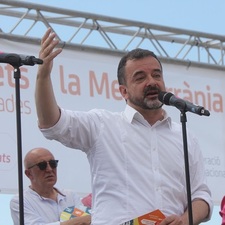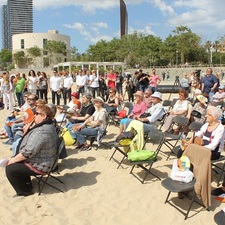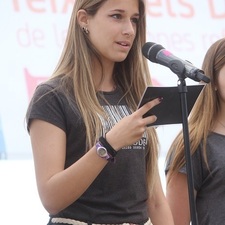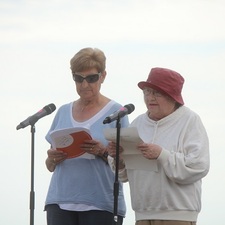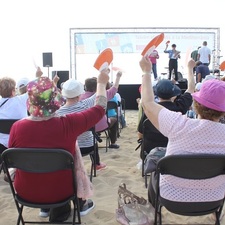AMB and metropolitan municipal councils convene an event in support of refugees
| Subject: International Cooperation
The event ‘We weave rights for refugees in the Mediterranean', the final event in the "Tenim drets, Teixim Llibertats" (We have rights, we weave freedoms) programme, was attended by more than 300 people at Nova Icària beach in Barcelona. The municipalities involved had woven a large tapestry with messages and demands about the rights of refugees, and covered the Mediterranean, symbolising the desire for a sea of solidarity and commitment.
Weaving freedoms in the Mediterranean
The centrepiece of the event consisted of a performance on the sand on the beach in which volunteers from the seven participating municipalities sewed together the seven tapestries they had woven separately, containing their complaints, wishes and proposals for human rights for refugees. A little earlier, the Begues rugby team and the NGOs Cooperació en Acció and Proactiva Open Arms had symbolically staged a rescue on the high seas.
The event also included the testimony of Hussam Alahamad, a Syrian refugee living in Catalonia. In his speech, he stressed ‘the gratitude of refugees who, fleeing terrorism both by terrorist groups and the Syrian state itself, have been fortunate enough to end up in Catalonia'. He added that ‘you can be sure that we will never forget it'.
At the close of the event, Alfred Bosch, Vice President of the International Relations and Cooperation Area, said that ‘despite the fact that hosting refugees in our country speaks volumes about us as a people, we must not forget that what people really want is not to have to leave their own country, and it is therefore necessary to resolve the situation in those countries'.
AMB's International Relations and Cooperation Area, with the help of the municipalities, is committed to global justice, and with this metropolitan programme it has sought to raise citizens' critical awareness and commitment to global inequalities and conflicts, in order to promote social transformation.
This metropolitan programme was therefore the beginning of a working area on Education for Global Justice within AMB. The activities of this new work unit will include producing information and awareness materials for the public and the design and organisation of projects in the metropolitan area adapted to different groups (youth, children, adults, women's groups, people with disabilities, people from different backgrounds, etc.). Events like the one held today help make human rights an issue that is more relevant to the population of the metropolitan area.
AMB carries out and supports projects in defence of refugees' human rights in Lebanon, Jordan, Greece and Turkey.
Raising awareness of the humanitarian crisis in the Mediterranean
Since last year and continuing in 2017, given the serious nature of the vulnerability that hundreds of thousands of people in the Mediterranean are still experiencing due to the conflicts in the Middle East, this first edition of the "Tenim Drets, Teixim Llibertats" (We have rights, we weave freedoms) programme has focused on promoting human rights for refugees. According to figures from UNHCR, approximately 322,000 people crossed the Mediterranean to Europe in 2015, fleeing violence and persecution, and this number has continued to increase in recent years. The war in Syria, which began in 2011, has already internally displaced 7.6 million people and made 4 million people refugees.
According to the United Nations Refugee Agency, in late 2015 65 million people worldwide had been forced to flee their homes. In other words, one in every 113 people on the planet is someone who has been granted asylum, is a refugee or is a displaced person.
The programme organises various activities and workshops for citizens of all ages in the participating municipalities, and raises awareness of the conditions affecting refugees and asylum seekers, promotes understanding and respect, and fosters changing attitudes.













































